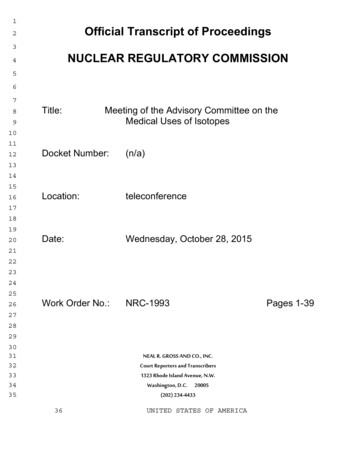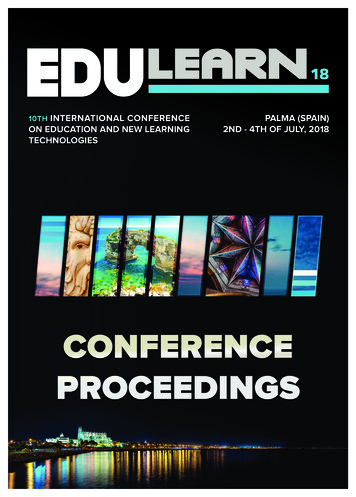
Transcription
CONFERENCEPROCEEDINGS
Published byIATED Academyiated.orgEDULEARN18 Proceedings10th International Conference on Education and New Learning TechnologiesJuly 2nd-4th, 2018 — Palma, Mallorca, SpainEdited byL. Gómez Chova, A. López Martínez, I. Candel TorresIATED AcademyISBN: 978-84-09-02709-5ISSN: 2340-1117Depósito Legal: V-1578-2018Book cover designed byJ.L. BernatAll rights reserved. Copyright 2018, IATEDThe papers published in these proceedings reflect the views only of the authors. Thepublisher cannot be held responsible for the validity or use of the information thereincontained.
EDULEARN1810th International Conference on Education and New Learning TechnologiesEDULEARN18 COMMITTEE AND ADVISORY BOARDAgnes KrizAgustín LópezAleksandra Kulpa-PuczynskaAline Grunewald NicheleAmparo GirósAna Mouta CostaAna TomásAnita HabókAnn ConwayAntonio GarcíaAUSTRIA Ignacio BallesterSPAIN Ignacio CandelPOLAND Ingolf WaßmannBRAZIL Irina KhoutyzSPAIN Isabel HuetPORTUGAL Iván MartínezSPAIN Ivana Ogrizek BiskupicHUNGARY Janet HerrelkoIRELAND Janine DelahuntySPAIN Javier DomenechAshling Ryan-ManganIRELAND Javier MartíBeata GodejordNORWAY Joanna LeesBéatrice ArendBerhannudin Mohd SallehCelia MacDonnellCharles ElkabasChelo GonzálezChris SchabenChristian BourretCole WebberCristiano LuchettiCristina Sayuri DusiLUXEMBOURG Jose F. CabezaMALAYSIA Jose Luis BernatUNITED STATES Josephine DesouzaCANADA Josephine MunthaliSPAIN Judith SzerdahelyiUNITED STATES Kalaimagal RamakrishnanFRANCE Kari BjörnCANADA Kateřina VitáskováU.A.E. Kristin BroganBRAZIL Laura BordiSPAIN Marta DzilumaLATVIASPAIN Martin MaltaisCANADAGERMANY Michael CroninRUSSIAN FED. Michal PalkoU. KINGDOM Michela BaraldiITALYSLOVAKIAUNITED STATESSPAIN Minerva CorderoUNITED STATESCROATIA Norbert EnglischGERMANYUNITED STATES Norma BarrachinaAUSTRALIA Olyesya RazdorskayaSPAIN Paolo SomigliSPAIN Patricia ReynoldsFRANCE Patsy Robles-GoodwinSPAIN Peter HaberSPAIN Petr SudickyUNITED STATES Piedade Vaz-RebeloU. KINGDOM Piotr BerkowskiUNITED STATES Rafael Fernández-FloresMALAYSIA Rahimah EmbongFINLAND Rita KumarCZECH REP. Roma KriaučiūnienėIRELAND Rosa KarnitaFINLAND Sabina MaraffiSPAINRUSSIAN FED.ITALYUNITED STATESUNITED STATESAUSTRIACZECH REP.PORTUGALPOLANDMEXICOMALAYSIAUNITED STATESLITHUANIAU. KINGDOMITALYDaniel BoulosUNITED STATES Lorena LópezSPAIN Sergio PérezSPAINDavi De ContiBRAZIL Luís DescalçoPORTUGAL Shaun SpeedU. KINGDOMDavid DaltonU.A.E. Luis Gómez ChovaDavid MartíSPAIN Lynn BoyleDespina Varnava MarouchouDouglas BaleshtaDragos TataruEladio DuqueEmine KuluşaklıFilip DevosFritz VandoverGarold ZborovskyGemma van Vuuren CassarHen FrimanCYPRUS Mª Jesús SuestaCANADA Margaret MackayROMANIA Marge TäksSPAIN M de Nazaré Souza RibeiroTURKEY Maria PorcelBELGIUM Maria ReGesterUNITED STATES Maria Schwarz-WoelzlRUSSIAN FED. Maria-Iuliana DascaluSPAIN Shujaat WastyU. KINGDOM Svein Thore HagenSPAIN Tetyana AntimirovaCANADANORWAYCANADAU. KINGDOM Thomas RachfallGERMANYESTONIA Tiziano TelleschiITALYBRAZIL Tolga AkbulutSPAIN Tomas KalaUNITED STATES Victor FesterAUSTRIA Vidar GynnildROMANIA Vincenza BenignoTURKEYCZECH REP.NEW ZEALANDNORWAYITALYU. KINGDOM Mario De TullioITALY Wendy GortonUNITED STATESISRAEL Mark WilkinsonSINGAPORE Xavier LefrancFRANCE
EDULEARN1810th International Conference on Education and New Learning TechnologiesCONFERENCE SESSIONSORAL SESSIONS, 2nd July 2018Immersive Learning & Virtual RealityPeer Learning and Teaching21st Century Skills (1)Students' Wellness and WellbeingQuality and Excellence in Teacher TrainingEnglish as a Foreign Language (1)Mobile LearningICT in EducationActive Learning (1)Virtual Reality in EducationFlipped LearningWorkplace Learning (1)Joint and Dual DegreesTeacher Training ExperiencesProfessional Development of Foreign Language TeachersProgramming and Coding Skills (1)Technology Enhanced Learning (1)Active and Game-Based LearningAugmented Reality in EducationLearning by Doing & Experiential LearningWorkplace Learning (2)University-Industry CollaborationICT Skills among Teachers (1)Health Education TechnologiesProgramming and Coding Skills (2)Educational Games DesignActive Learning (2)Social Media and Social Networks in EducationProject, Problem and Inquiry-Based LearningEntrepreneurship EducationInternational Collaboration ExperiencesICT Skills among Teachers (2)Engineering EducationLearning Space DesignDigital Skills & Media LiteracyDropout Prevention & Students' MotivationPOSTER SESSIONS, 2nd July 2018Emerging Technologies in EducationPedagogical Innovations and New Educational Trends
EDULEARN1810th International Conference on Education and New Learning TechnologiesORAL SESSIONS, 3rd July 2018e-Learning Experiences (1)Videos for LearningSpecial Education (1)Language Learning EducationCultural Diversity & Inclusion (1)Curriculum Design in EngineeringLearning Analytics (1)Tutoring & MentoringWriting Skills and PerformanceLearning Management Systems (LMS)Serious GamesSpecial Education (2)Technology Enhanced Learning (2)Pre-Service Teacher EducationLanguage Learning: from ESP to EMILearning Analytics (2)e-AssessmentQuality Assurance and Accreditation in Higher EducationPersonalized LearningBlended LearningTeacher Training in Special EducationSTEM Education (1)Professional Development of TeachersLanguage Learning TechnologiesInformal LearningNew technologies in AssessmentLeadership and Management in EducationMassive Open Online Courses (MOOC)Flipped ClassroomSpecial Needs and Inclusive EducationMaths and Statistics in Higher EducationCreativity in EducationEnglish as a Foreign Language (2)Gamification & Game-Based LearningAssessment of Student Learning (1)Management in Higher Educatione-Learning Experiences (2)Effective Teaching PracticesCultural Diversity & Inclusion (2)STEM Education (2)Soft Skills DevelopmentBusiness and Accounting Education21st Century Skills (2)Assessment of Student Learning (2)Sustainability EducationPOSTER SESSIONS, 3rd July 2018Experiences in EducationGlobal Issues in Education and Research
EDULEARN1810th International Conference on Education and New Learning TechnologiesVIRTUAL SESSIONS21st Century SkillsAcademic Research ProjectsAugmented RealityBarriers to LearningBlended LearningCollaboration Projects and NetworksComputer Supported CollaborationCurriculum Design and DevelopmentDesign Thinking and CreativityDiversity Issues, Women and MinoritiesE-content Management and Developmente-Learning Projects and ExperiencesEarly Childhood and Preschool EducationEducating the EducatorsEducation and GlobalizationEducational ManagementEducational Software & Serious GamesEducational Trends and Best Practice ContributionsEmerging Technologies in EducationEnhancing Learning and the Undergraduate ExperienceEntrepreneurship CurriculumEthical Issues in EducationEvaluation and AssessmentEvaluation and Assessment of Student LearningExperiences in ResearchFlipped LearningGame Based LearningHigher and Further EducationHigher Education Area: The Bologna Declaration and ECTS ExperiencesImpact of Education on DevelopmentInformal learningLanguage Learning InnovationsLeadership in EducationLearning and Teaching MethodologiesLearning by doing & Experiential LearningLearning Management Systems (LMS)Lifelong LearningLinks between Education and ResearchMassive Open Online Courses (MOOCs)Mobile and Tablet TechnologiesMobile LearningMulticultural EducationNeuroscience in EducationNew Learning/Teaching ModelsOnline/Virtual LaboratoriesOrganizational, Legal, Policy and Financial IssuesPre-service and In-service Teacher ExperiencesPrimary and Secondary EducationProblem and Project-Based LearningProfessional Development of TeachersQuality Assurance and AccreditationSocial & Digital Media in EducationSpecial Education & Inclusive LearningSTEM in EducationStudent Support in EducationTeam-Based and Collaborative LearningTechnology-Enhanced LearningThe Impact of Web Technologies on EducationTraining Educational StaffTransferring Skills and DisciplinesUniversity-Industry CooperationVirtual Learning Environments (VLEs)Virtual Reality and 3D ApplicationsVocational TrainingWeb 2.0 and Social NetworkingWorkplace Training and Employability Issues
EDULEARN1810th International Conference on Education and New Learning TechnologiesABOUT EDULEARN18 ProceedingsHTML Interface: Navigating with the Web browserThis USB Flash drive includes all presented papers at EDULEARN18 conference. It hasbeen formatted similarly to the conference Web site in order to keep a familiarenvironment and to provide access to the papers trough your default Web browser(open the file named "EDULEARN18 Proceedings.html").An Author Index, a Session Index, and the Technical Program are included in HTMLformat to aid you in finding conference papers. Using these HTML files as a startingpoint, you can access other useful information related to the conference.The links in the Session List jump to the corresponding location in the TechnicalProgram. The links in the Technical Program and the Author Index open the selectedpaper in a new window. These links are located on the titles of the papers and theTechnical Program or Author Index window remains open.Full Text Search: Searching EDULEARN18 index file of cataloged PDFsIf you have Adobe Acrobat Reader version 6 or later (www.adobe.com), you canperform a full-text search for terms found in EDULEARN18 proceedings papers.Important: To search the PDF index, you must open Acrobat as a stand-aloneapplication, not within your web browser, i.e. you should open directly the file"EDULEARN18 FrontMatter.pdf" with your Adobe Acrobat or Acrobat Readerapplication.This PDF file is attached to an Adobe PDF index that allows text search in all PDFpapers by using the Acrobat search tool (not the same as the find tool). The full-textindex is an alphabetized list of all the words used in the collection of conferencepapers. Searching an index is much faster than searching all the text in the documents.To search the EDULEARN18 Proceedings index:1. Open the Search PDF pane through the menu "Edit Advanced Search" or click in thePDF bookmark titled "SEARCH PAPERS CONTENT".2. The " EDULEARN18 index.pdx" should be the currently selected index in the Searchwindow (if the index is not listed, click Add, locate the index file .pdx, and then clickOpen).3. Type the search text, click Search button, and then proceed with your query.For Acrobat 9 and later:1. In the “Edit” menu, choose “Search”. You may receive a message from Acrobat askingif it is safe to load the Catalog Index. Click “Load”.2. A new window will appear with search options. Enter your search terms and proceedwith your search as usual.For Acrobat 8:1. Open the Search window, type the words you want to find, and then click UseAdvanced Search Options (near the bottom of the window).2. For Look In, choose Select Index.3. In the Index Selection dialog box, select an index, if the one you want to search isavailable, or click Add and then locate and select the index to be searched, and clickOpen. Repeat as needed until all the indexes you want to search are selected.4. Click OK to close the Index Selection dialog box, and then choose Currently SelectedIndexes on the Look In pop-up menu.5. Proceed with your search as usual, selecting other options you want to apply, and clickSearch.For Acrobat 7 and earlier:1. In the “Edit” menu, choose “Full Text Search”.2. A new window will appear with search options. Enter your search terms and proceedwith your search as usual.
COLLABORATIVE LEARNING AND VIRTUAL LABORATORIES. ANEW WAY OF TEACHING AND LEARNING ON THE INTERNETMaria Amata GaritoInternational Telematic University UNINETTUNO (ITALY)AbstractThis paper illustrates the results of research activities on collaborative learning and the virtuallaboratories that are available in the International Telematic University UNINETTUNO’s platform. Inparticular, the interaction models, created in UNINETTUNO Island of Knowledge where the avatars ofteachers and students contribute to realize environments characterized by a strong sense of realitythat promote collaborative learning and learning-by-doing, are analyzed. Secondly, concreteapplications, such as virtual laboratories controlled from remote and through smart phones, based onan in-depth study of the complex interrelations existing between communication technologies andcognitive models and between technologies and the theoretical models on which distance teachingand learning processes rely on, are illustrated. Thanks to virtual laboratories the students can applythe theories learnt in other learning environments of the cyberspace, they can handle and interact withvirtual objects, formulate and test hypotheses. In this learning activity, the students, besides beingassisted by a human teacher-tutor, can also have the support of automated pedagogical agents.Additionally, I describe the UNINETTUNO University’s tridimensional virtual laboratories that arerealized in the framework of international research programs allowing to connect with otherlaboratories worldwide as well as to redefine the geography itself of research and innovation.Keywords: e-learning, distance education, virtual laboratories, remote laboratories.1RESEARCH ACTIVITIESUNINETTUNO has always attached great importance to theoretical as well as applied research work.Beside research programs linked to single faculties and disciplines, there is a university research areawhose aim is to: Conduct research work to keep on innovating the psycho-pedagogic-didactic models of thedistance courses; Identify working models for applying technologies that allow enhancing the services provided bythe University; Identify qualitative and quantitative assessment standards aimed at highlighting theeffectiveness and efficiency of the whole University’s system; Develop tridimensional and augmented-reality applications in UNINETTUNO’s distanceteaching and learning processes; Identifying models assuring the security of students’ distance assessment systems.The results of this research work allow for a continuous monitoring of the potentials of the varioustechnologies to connect their development to new knowledge communication models in order to beable to rely on a consistent body of theoretical and operational knowledge granting a fair balancebetween the technological-engineering components and the cognitive, methodological, cultural andeducational components specific of education.This type of interdisciplinary research is connected to cognitive science, psychology, pedagogy,linguistics, computer science and engineering. These research teams have already producedepistemological models, strategies of analyzing problems in their respective disciplinary fields thatallowed for identifying the complex interrelations existing between communication technologies andcognitive processes, in particular, among technologies and theoretical models on which theimplementation of distance teaching and learning processes rely. On the basis of this research workwe realized the three-dimensional worlds of UNINETTUNO Island of Knowledge. Collaborativeteaching-learning environments are realized in the three-dimensional virtual classrooms and “learningby-doing” processes are developed in the virtual laboratories”.Proceedings of EDULEARN18 Conference2nd-4th July 2018, Palma, Mallorca, Spain3582ISBN: 978-84-09-02709-5
2VIRTUAL CLASSROOMS IN THE 3D ENVIRONMENTS OF UNINETTUNOPLATFORMCollaborative learning activities are carried on also in the three-dimensional worlds of the virtualclassrooms available in UNINETTUNO’s platform. The three-dimensional virtual environment, byhandling variables such as space, the roles and interaction between the avatars of actual individuals,creates a setting that is characterized by a strong sense of reality in which the actual individual-avatarfigures out the potentials for interacting with the available environment and with the other avatars thatare present. The individual is immersed in a new dynamic reality in which he is not a mere viewer, buta protagonist. The individual is surrounded by a new dynamic reality where he is no longer only amere viewer, but an actual player.The experience made in this reality is highly emotional and is deeply involving; the individual is“attracted” into a new virtual world which has all the features of the real world.In the three-dimensional virtual classroom of UNINETTUNO Island of Knowledge, students andteachers-avatars develop learning processes experimenting a new immersive-collaborative learningdimension. The students use interactive tools, they make practical exercises, mid-term assessmenttests, dialogue and learn in a cooperative and collaborative way and become active constructors ofknowledge.The training provisions envisage a teaching model resembling that of the “flipped-classrooms”:students are led to learn in advance about issues linked to the planned discussion; then they study thevideo lessons, the reference texts, books, lecture-notes, articles, essays, preparing themselves toparticipate in the debate with the teacher-tutor. In the second phase, the avatars of students andteachers-tutors meet in the three-dimensional virtual world and they take their seats in the classroomin which the avatar of the teacher-tutor asks questions to the avatars of the students in order to assesstheir skill-level. In this phase, the questions being asked are more important than their relativeanswers; they represent the basis on which to start the discussion, or better, the disputatio. Throughthe disputatio – inspired to the learning model of the Medieval universities – they foster a learningprocess taking origin from dialogue and exchange, they learn from other people and reflect on theirown ideas.Learning becomes a process involving the student in thinking about and conceiving multipleperspectives and viewpoints. In their approach to knowledge, they promote creativity and criticalappreciation. It is interaction, dialogue and exchange which add value to this type of learning. 3Dimmersive worlds allow for penetrating into the digital body to perceive oneself no longer as a personsitting before the screen of a PC, but, actually, as being in a virtual classroom animated by actualteachers and students. In the Island of Knowledge debates and conferences among students, expertsand teachers coming from other universities around the world take place. In these virtual spacessocial, entertaining and recreational aspects are experienced as well.The utilization of a virtual world and of avatars as representations of one’s own virtual body enhanceinvolvement and participation, an essential feature of both educational and social interaction. Thethree-dimensional virtual world is becoming a a more and more interesting tool for uniting the twodimensions, the one which is more linked to education and the one that is more linked to socializationand entertainment. The aspect of social interaction, as a starting element for implementingUNINETTUNO’s psycho-pedagogic model, finds a more appropriate environment for developingconstructive and collaborative learning processes and socialization processes in three-dimensionalvirtual classrooms.3VIRTUAL LABORATORYIn the virtual laboratories of the three-dimensional environments realized in UNINETTUNO’s platform,the student can put into practice the theoretical principles learnt in the video lessons, starting up a“learning-by-doing” process.Human mind works better on concrete and specific cases than on abstract data. The strongestlearning is that build by “doing”, therefore making mistakes and correcting them, instead of learning ina mechanical way or passively watching the demonstration made by an expert.In interactions taking place in virtual laboratories, the student is guided, along his learning path, bothby an expert teacher-tutor and by an intelligent system. We know that is more difficult to teach3583
somebody to carry on complex assignments; in order to be
Fritz Vandover UNITED STATES Maria Schwarz-Woelzl AUSTRIA Vidar Gynnild NORWAY Garold Zborovsky RUSSIAN FED. Maria-Iuliana Dascalu ROMANIA Vincenza Benigno ITALY . Early Childhood and Preschool Education Educating the Educators Education and Globalization Educat
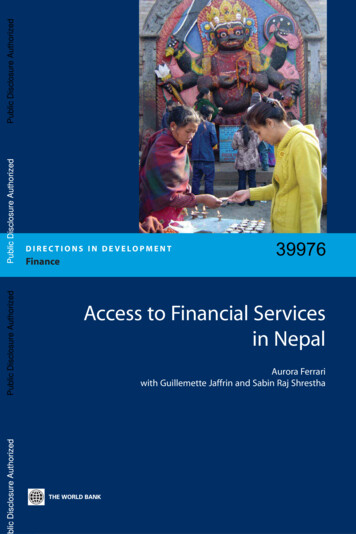
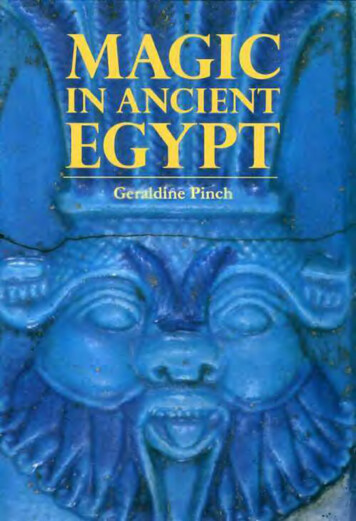
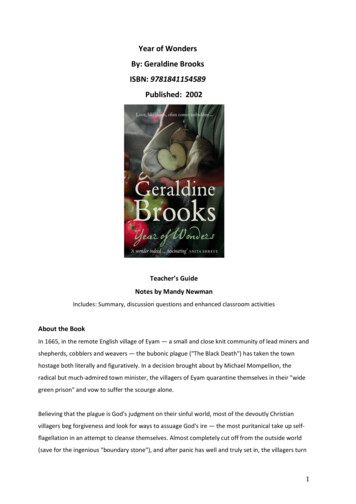
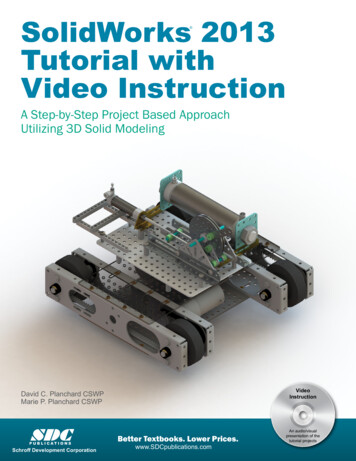

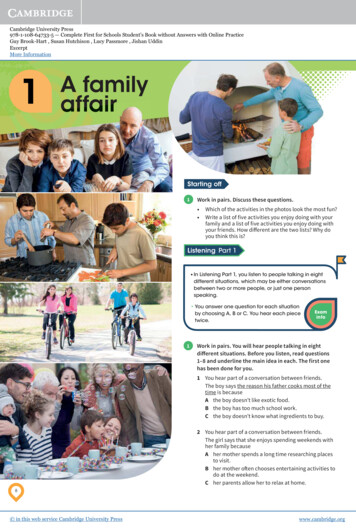
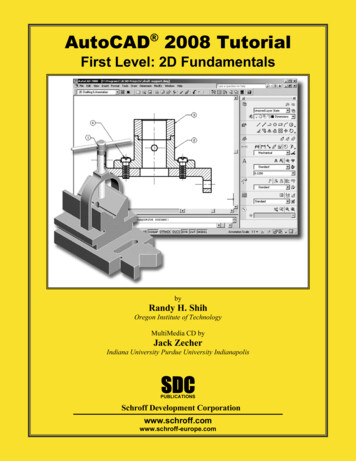
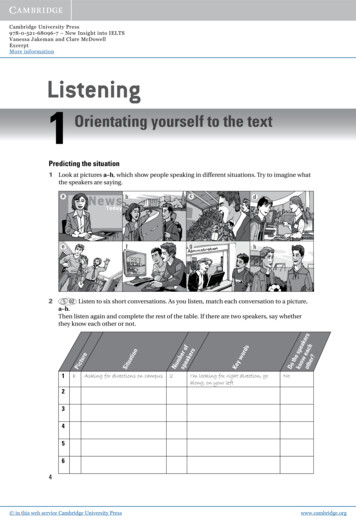
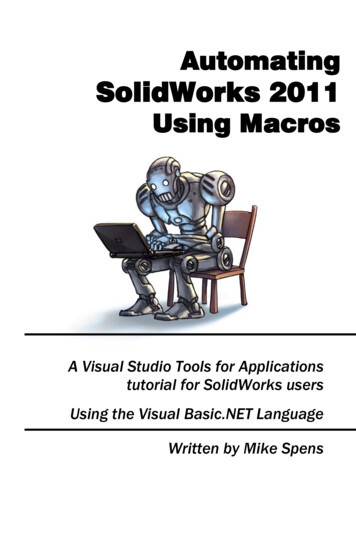
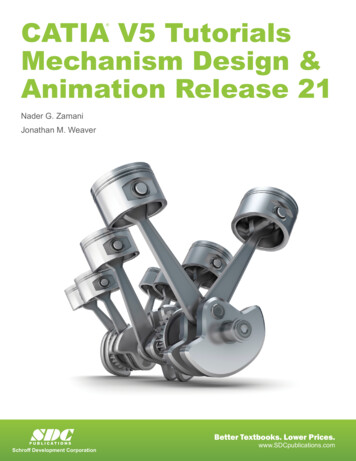
![[Page 1 – front cover] [Show cover CLEAN GET- AWAY 978-1 .](/img/13/9781984892973-6648.jpg)
